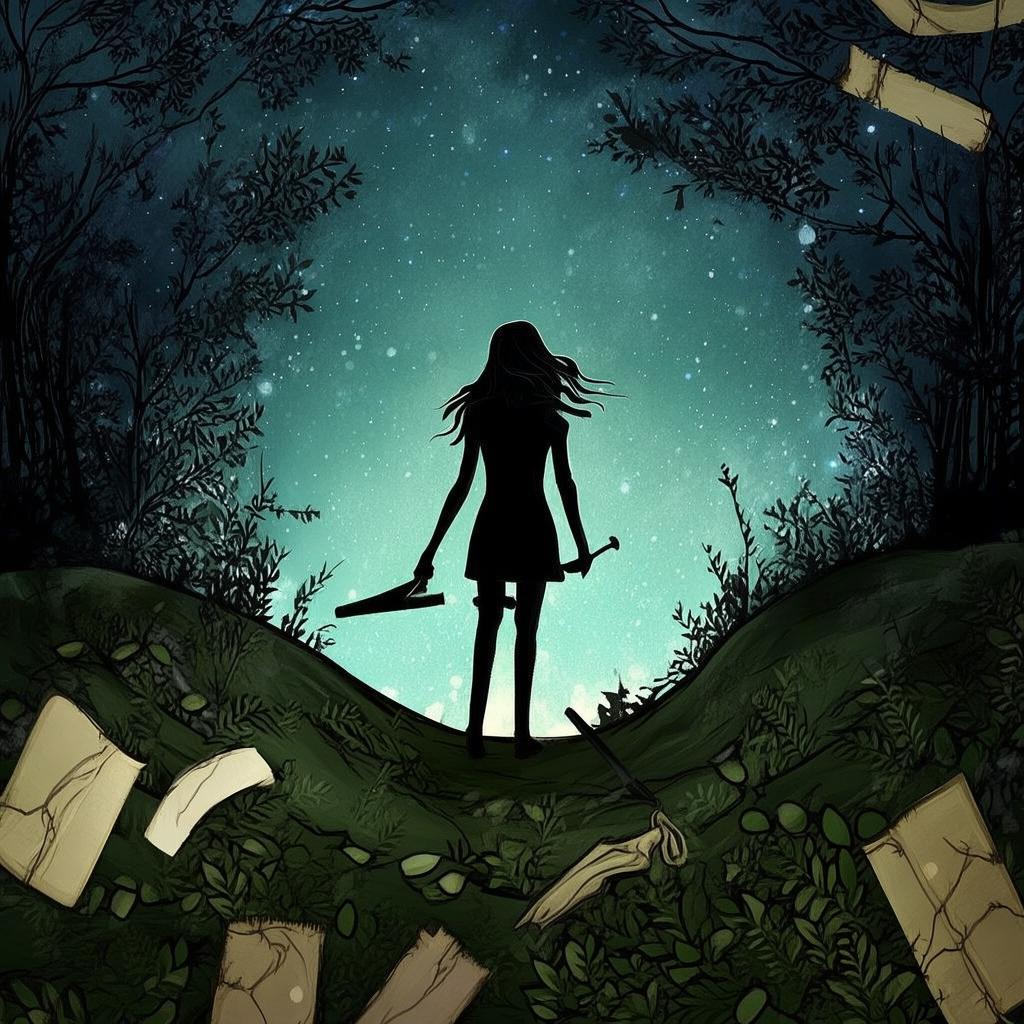The Last Resonance of Echoes
In the quiet town of Eldridge, where the streets were paved with the whispers of yesteryears, lived a young woman named Elara. She was an artist, her soul painted on canvas, and her heart a canvas in itself. Elara had always been intrigued by the stories her grandmother told of a love so deep and tragic that it spanned lifetimes. One rainy afternoon, while cleaning out her grandmother's attic, she stumbled upon an old, dust-covered black box.
Curiosity piqued, Elara opened the box and was immediately drawn to a collection of letters and photographs. The letters were written in an elegant script, filled with passion and despair. The photographs, black and white, showed a couple in love, their faces etched with the pain of separation and longing. The woman in the pictures looked strikingly similar to Elara, and the man, a stranger to her, bore a haunting resemblance to her own father.
Intrigued and a little unnerved, Elara began to read the letters. They told the story of a love that defied time and space. The man, Alexander, had been a soldier during World War II, and the woman, Isabella, had been left behind in Eldridge. They had exchanged letters for years, their words a lifeline across the vast ocean of war. But the war had claimed Alexander's life, and Isabella had never received his final message.
As Elara read on, she discovered that Alexander had written a last letter, one he never sent. The words were raw, filled with love and a desperate plea for Isabella to live on, to find happiness in the memories of their love. It was a letter of redemption, a testament to the enduring power of love even in the face of loss.
Elara felt a strange connection to Isabella and Alexander, as if she were walking in their footsteps. She found herself drawn to the town, to the very places where they had once walked. She began to visit the places mentioned in the letters, the park where Alexander proposed, the library where they had their first date, and the church where they had been married in secret.
As she wandered through Eldridge, Elara noticed the townspeople's reactions. Some looked at her with a mixture of curiosity and concern, while others seemed to recognize her without ever meeting her. She felt as if she were part of a story that was still unfolding, even though the main characters had long passed away.
One evening, as Elara stood by the river where Alexander had often watched for the boat that would bring him back home, she met a man named Lucas. He was kind and thoughtful, and he shared with her his own story of love and loss. Lucas had lost his wife to cancer, and he too sought solace in the town's history and the stories it held.
The two formed an unspoken bond, sharing their pain and finding comfort in each other's company. Elara felt as if she were completing a cycle, as if she were carrying on the legacy of Alexander and Isabella. Lucas, in turn, saw in Elara a kindred spirit, someone who understood the depth of his sorrow.
One day, as they walked together through the park, Elara mentioned the black box and the letters she had found. Lucas' eyes widened with recognition. He revealed that his grandmother had been Isabella, and that the black box had been his family's most cherished possession. It was a revelation that tied Elara even more closely to the story.
As the days passed, Elara and Lucas grew closer. They shared their hopes, fears, and dreams, and they found solace in each other's presence. But as the story of Alexander and Isabella unfolded more fully, it also brought to light the dark secrets that had long been buried in Eldridge.
It turned out that Alexander had not died in battle, but had instead been captured and executed by the enemy. Isabella, in her grief, had vowed never to leave Eldridge, never to let anyone else suffer the pain she had endured. The town had become a symbol of her love, but also a prison of her sorrow.
Elara and Lucas learned that Isabella had not been able to forgive herself for her role in Alexander's capture. She had carried the weight of his death on her shoulders for decades, her heart a black box of her own. And now, with Elara's arrival, the box had been opened, revealing the truth and the love that had been hidden within.
The climax of the story came when Elara and Lucas, with the help of the townspeople, discovered Isabella's hidden grave. They found her surrounded by the letters and photographs, her body still holding onto the hope that Alexander's spirit would find her.

In a powerful and emotional moment, Elara and Lucas laid Isabella to rest, finally giving her the peace she had never found in life. The town of Eldridge, which had been a symbol of love and loss, now became a place of healing and remembrance.
The ending of the story was bittersweet. Elara and Lucas had found a deep connection, but they also realized that their paths were destined to diverge. Elara had come to Eldridge to complete a cycle, to honor the love of Alexander and Isabella. Lucas, though he had found solace in Elara, knew that he needed to return to his own life, to carry on his own legacy.
Elara left Eldridge with a heart full of gratitude for the lessons she had learned and the love she had shared. She returned to her own life, her art now reflecting the depth and beauty of the love that had been revealed to her.
And so, the story of Alexander and Isabella lived on, not just in the letters and photographs, but in the lives of those who had been touched by their love. Elara's journey had been a redemption of sorts, a revelation that even in the face of tragedy, love could endure and bring healing.
✨ Original Statement ✨
All articles published on this website (including but not limited to text, images, videos, and other content) are original or authorized for reposting and are protected by relevant laws. Without the explicit written permission of this website, no individual or organization may copy, modify, repost, or use the content for commercial purposes.
If you need to quote or cooperate, please contact this site for authorization. We reserve the right to pursue legal responsibility for any unauthorized use.
Hereby declared.









